What Does It Really Mean to Have a Croatian Identity?
July 11, 2022 - Passport, residence, language... when it comes to Croatian identity, what really builds it? After almost three years living in Croatia, I ask myself some questions.
Not long ago, I agreed to help a master's student with her thesis, in which she sought to learn more about South Americans of Croatian ancestry and how the experience of studying the Croatian language in Croatia has helped them forge a kind of Croatian identity. For those not so familiar, the Croatian Government offers a Croatian language study scholarship through the Central State Office for Croats Abroad, in which people who have completed secondary education and who belong to the Croatian community in one way or another, can travel to five Croatian cities (Zagreb, Split, Rijeka, Osijek and now Zadar) to learn more about the country's language and culture. The experience also allows them to explore their roots further, and even presents them with an excellent opportunity to resolve issues related to their citizenship, passport, and more.
Having studied two semesters in Rijeka and one in Zagreb, and being only a few months away from completing three years living in Croatia, I thought that my experiences and anecdotes could be useful for her research. I can now say that for me it was a very introspective conversation. I don't remember the last time I asked myself so many questions about my experience in Croatia so far, or even about my own identity. One of the questions was: ''What makes you feel Croatian?'' I didn't mean to downplay that question, but my answer was simple: ''I'm not Croatian. I am Peruvian''. It makes one wonder, what exactly makes a Croatian identity? What does it really consist of? It may be several factors, such as the following:
Croatian ancestry
I have met many people throughout the years who told me about how their Croatian-born parents taught them about the country they come from or told me about the Croatian dishes and delicacies that their grandparents prepared at home. It's something that, as a sixth-generation Croatian, I couldn't understand unless I was told about it. Little do we know about my ancestor's life and his reasons for leaving Croatia. Over time we have learned that he died young when his son was just a child. And that son grew up and had his own family, and he also died when his son was very young. Thus, in future generations, the sense of belonging was lost or simply ignored.
In my case, and surely for many like me, the only thing we knew was that our last name is Croatian... and that is it. If we really wanted to get more familiar with those roots, it depended a lot on our own will or interest in learning more. Sometimes it seems that the less you know, the less you identify with a place.
Croatian citizenship
My father obtained Croatian nationality for himself, my siblings, and me when we were still little. Back then it was easier than it is now. Although we didn't know much about Croatia, when we got older we realised the difference between knowing the origin of your last name and having the Croatian Government officially recognise your ancestry. You'd think it wouldn't make much of a difference if you'd never left your own country, but somehow I thought it was a great way to pay tribute to my ancestor by acknowledging his own legacy.
Croatian passport
I didn't have a Croatian passport until I was 23 years old. Being from Peru, the only two feasible ways to obtain it were in Croatia (with the condition of being there during the length of time the process takes) or with an appointment at the Croatian Embassy in Chile. We didn't opt for any of those alternatives because we didn't see the need, during all these years, to have a passport. Suddenly we were presented with an opportunity to obtain a Croatian passport in our own country, and even without fully understanding the advantages beyond the obvious ones, we didn't even think twice.
There are many ways to answer the question, ''Where are you from?'' Some say, ''I'm from Argentina'', and others ''are from Australia''. Just as there are those who say that "they were born in Chile.'' But something I have also heard is from those who respond "I have a Croatian passport" to explain that they also have that citizenship. The passport, in addition to being a travel document that allows you to cross borders as a citizen of a particular country, has also been a symbol to show belonging to a nation. Although I felt like I had taken a big step towards knowing more about my roots the day I got mine, I also keep wondering if having the travel document of a country is enough to feel like part of it.
Residence in Croatia
In October it will be three years since I left everything to make Croatia my new home. This time has helped me understand that having residence in a country goes beyond having the police's permission to stay or even beyond owning or renting a square metre or two in a Croatian city. Living in Croatia involves becoming familiar with what surrounds you: public transport, shopping at the store, visiting the family doctor, walking the streets... all this has helped me feel that I'm adapting better and better to a new society. Having a Croatian ID in your wallet makes you feel there's now somewhere to call home. But is it enough?
Learn the Croatian language
For most, having the above is of little use if you don't know the language. In any case, having the ancestry, the citizenship, the passport or even living in Croatia, but not knowing the Croatian language, is like keeping that cultural gap wide open. There's a common misconception about Croatia as a country where you can get by only by speaking English. Although the majority of its local population speaks English, and very well, it could be said that it is merely a resource to facilitate communication with foreigners of all kinds. After studying the Croatian language for three semesters and empirically for another sixteen months, I still believe that my whole life in Croatia falls apart when I can't keep a conversation in Croatian afloat.
But having said all this, what is it then that makes you feel Croatian? Is it just one factor? Is it a combination of many? The only thing I know is that, at least for today, I'm far from being able to feel I have a Croatian identity.
I was born in Lima. I grew up there. My parents are Peruvian, as are my grandparents, as are my great-grandparents, and so on. The closest friends I've had since I was little are also Peruvian. I know the in-depth the history of my country, its many regions, its diverse cultures, and more. Although I'm adapting better and better to this country, I think I am very far from even considering myself Croatian. Furthermore, I believe that despite having citizenship, living here, having a passport, and learning the language, changing my identity is not something I'm looking for. Maybe its something that comes along naturally and is a process of its own.
For more news about the Croatian diaspora, visit our dedicated section.
20 Ways Croatia Changed Me in 20 Years: 4. Croatian Wine
July 12, 2022 - Twenty years a foreigner in Croatia. Part 4 of 20 Ways Croatia Changed Me in 20 Years - a new approach and appreciation of wine in Croatia.
Soon after I moved into the apartment above my soon-to-be parents-in-law, my father-in-law took me down to the garage. He was a lovely man, a real man of the soil, and the hardest-working person I ever met. We had no language in common back then and so I was curious as to what we would be doing in the garage.
At the back of the garage were three stainless steel tanks of about 200 litres each. The one on this left had three letters written on it - POL. A gift for me. He took an empty 1.5 litre empty plastic Coke bottle and filled it with his own red wine. It was very, very drinkable. And so life was very pleasant, as that bottle was refilled over and over again until one day nothing more came out of that magical tank. It was one of the many generous gifts he gave to all.
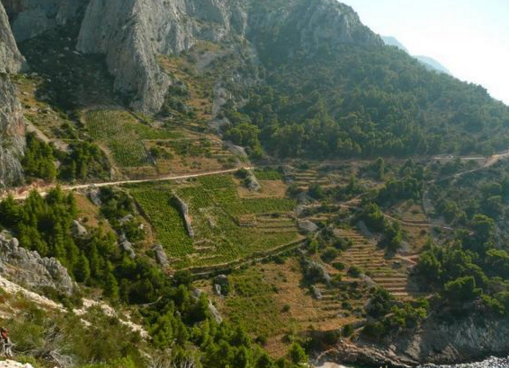
(The steep vineyards of southern Hvar, where some of the best Plavac Mali is produced)
And it was far from the only time I drank wine from an unmarked plastic bottle. In fact, I have probably drunk more wine from plastic bottles than proper wine bottles in my 20 years in Croatia.
For Croatians do wine in a VERY different way to the rest, and it is easily the most interesting wine country I have had the pleasure to explore. On so many levels.
I should explain that I have a little background in wine, having worked in our small family business importing wines from small family growers from France, Italy, Spain and Germany. I knew my Puligny Montrachets from my Chablis Grand Cru, my Cru Beaujolais from my Beaujolais Nouveau, as well as the taste of the few lesser-known quality grape varieties in the classic regions, such as Bourgogne Aligote, and the only time I would drink chilled red wine was a St Nicholas de Bourgueil on a hot summer's day.
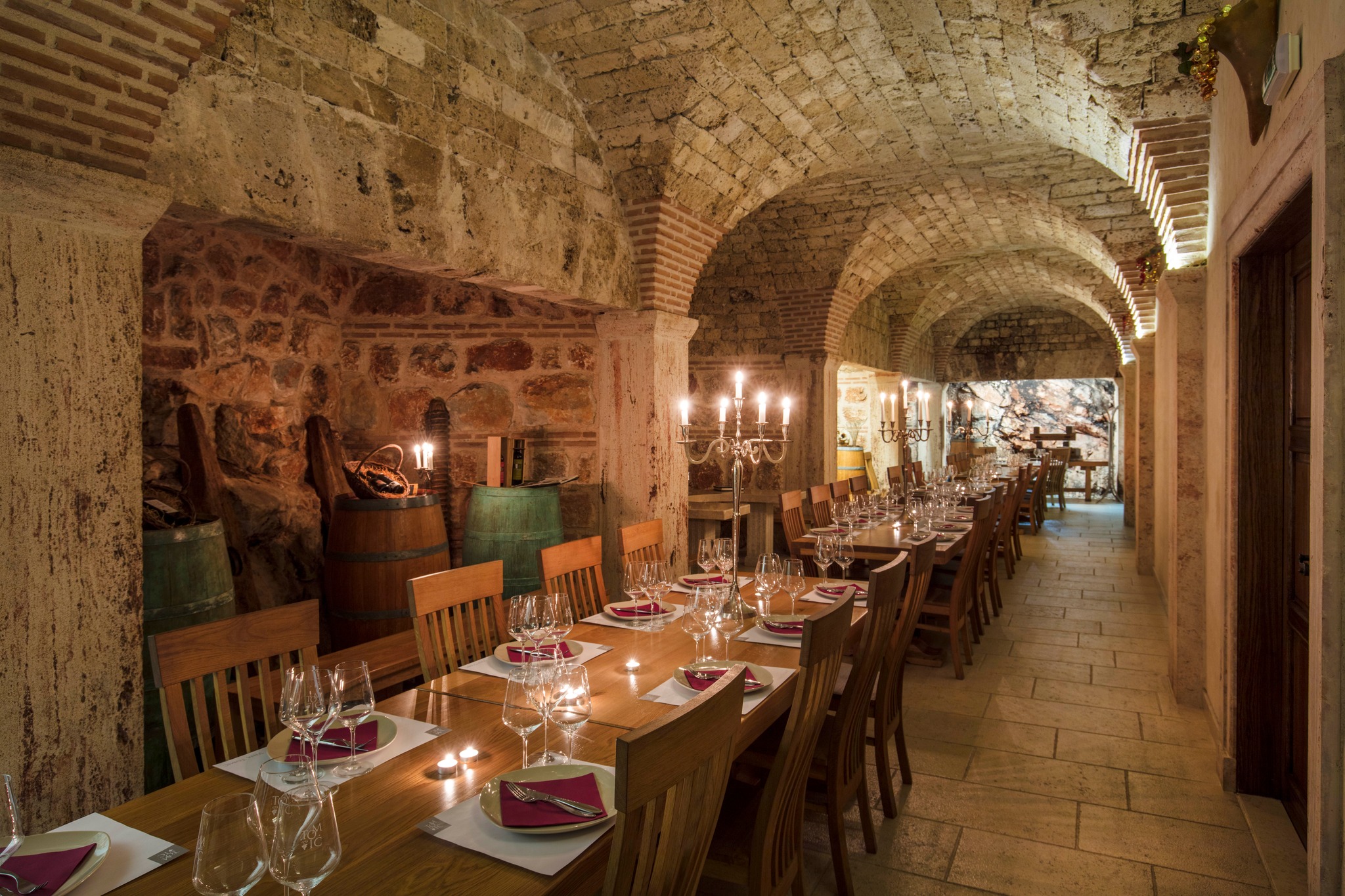
(The Andro Tomic wine cellars in Jelsa are one of the more impressive Croatian wine tasting locations)
And then I came to Croatia, whose wonderful - and relatively untold - wine story was the total opposite of everything I had come across elsewhere.
My Croatian wine journey did not start well. When I first arrived 20 years ago, the most common wines on the tables of Jelsa's restaurants were either house wine, or litre bottles of Faros red and Faros white. After a couple of attempts, I decided to stick to beer. Hvar may be a beautiful island, but its wines were not its stong point, I concluded.
How wrong I was!
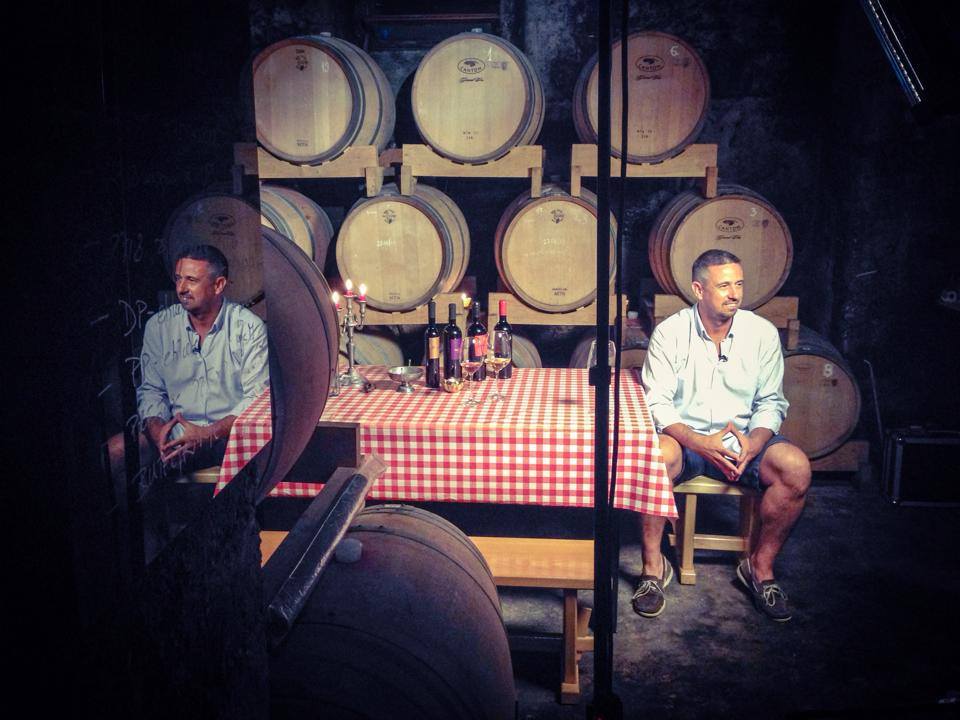
(Candlelit wine and olive oil tasting in the cellars of Ivo Dubokovic in Jelsa)
It was only years later when I started researching for the first edition of Hvar, An Insider's Guide, that I realised just what I had been missing. Not only was Hvar a wine island, but it had so MANY fascinating stories. A wine tradition dating back 2,400 with vines and olives brought by the invading Ancient Greeks, which are tended in much the same way today on a UNESCO World Heritage Site called the Stari Grad Plain. How cool is that? And while I may have been drinking average table wine in restaurants, those in the know were appreciating the quality. Among the Hvar wine portfolio was a hearty red which was served in a 3-star Michelin restaurant in Holland, an organic gold medal winner in Germany, and a Grand Cru which was a champion in Bordeaux. Indeed the wine scene on Hvar was so interesting that a British Master of Wine, Jo Ahearne, moved over from the UK to become the first MoW to produce wine in Croatia - Hands from London, Grapes from Hvar.
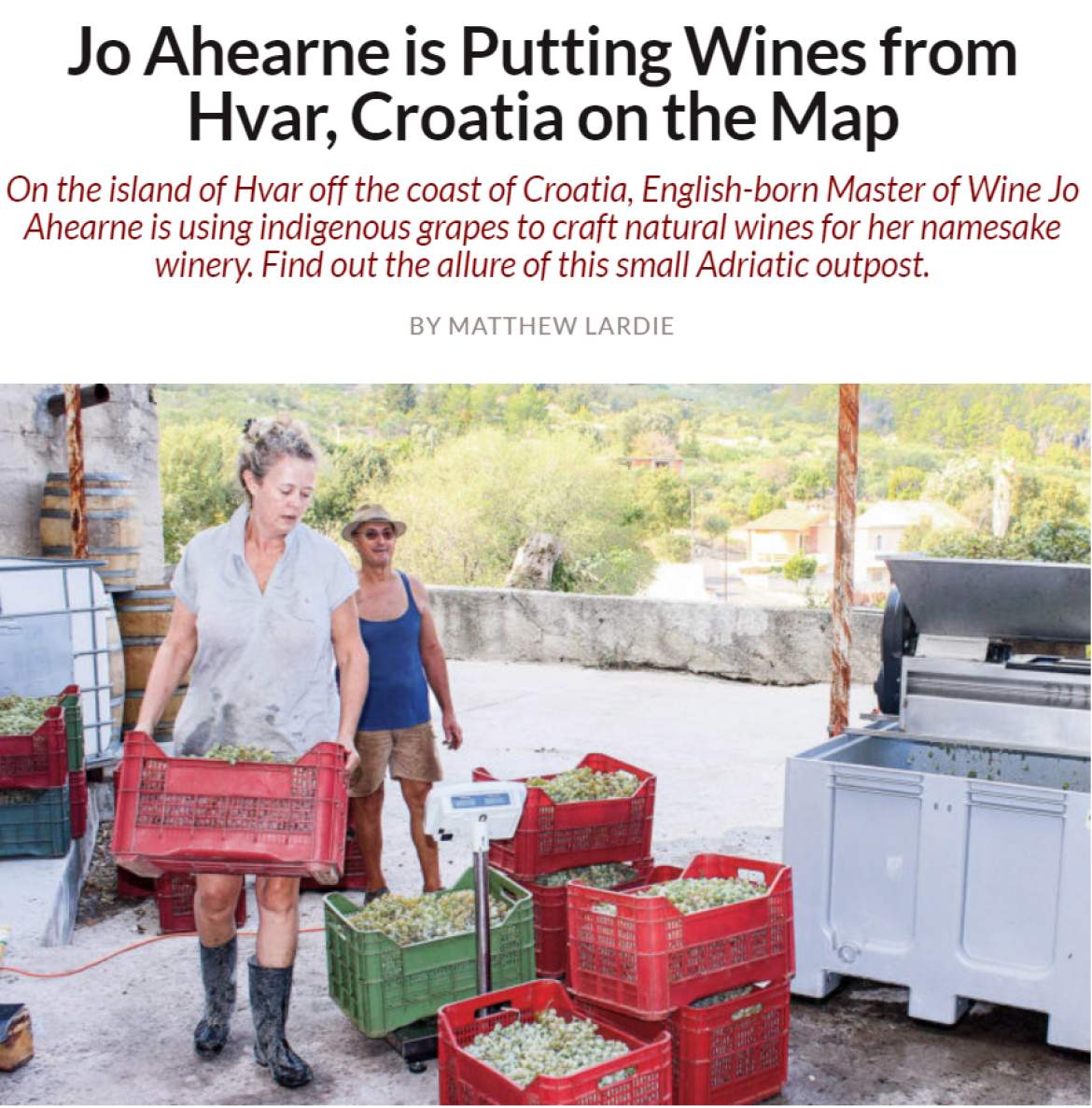
And it was the grapes from Hvar that was the biggest surprise.
As I started to research the Croatian wine scene, I was stunned. This small country apparently has more than 130 indigenous grape varieties. Among them was one called Crljenak Kastelanski, which researchers at the University of Davis proved in 2001 to be a 100% DNA match for the powerful Californian red, Zinfandel. That's right - the birthplace of Zinfandel is Dalmatia.
And the undisputed king of indigenous grape varieties, at least on Croatia's islands, was Hvar. Its best-known variety is a white called Bogdanusa - which translates as 'a gift from God' - but it is by no means the only one. Other varieties that only grew on Hvar, I learned, included Prc, Darnekusa and Kuc. But there was more to come.
Commercial private wineries are a relatively new thing in Croatia, given the socialist Yugoslav past, and they only began to emerge around 1990. Most of the wine was produced in large cooperatives, where the quality often suffered in favour of quantity (but with major exceptions, such as that organic gold-medal-winning PZ Svirce on Hvar). This to me is one of the most fascinating parts of the Croatian wine story. Small growers finding their way without experience of Western marketing and usually without much infrastructure. And each has a different vision and area of interest. One can visit Hvar, for example, and visit 10 wineries and wonder if you are on the same island.
One of my favourite little wineries to visit is a guy called Teo Huljic in the back streets of Jelsa. He only produces about 7,000 litres a year, much of which he sells in his adjacent restaurant, but his passion for wine and the island's heritage is addictive. While Hvar has several grapes that only grow on the island, Huljic has discovered and is preserving several more. He is the only winemaker in the world who produces a 100% Mekuja (around 600 bottles), and has even managed to bottle 70 litres of Palaruza, a very drinkable white that not even my father-in-law had heard of, and Google only had one entry on when I researched it.
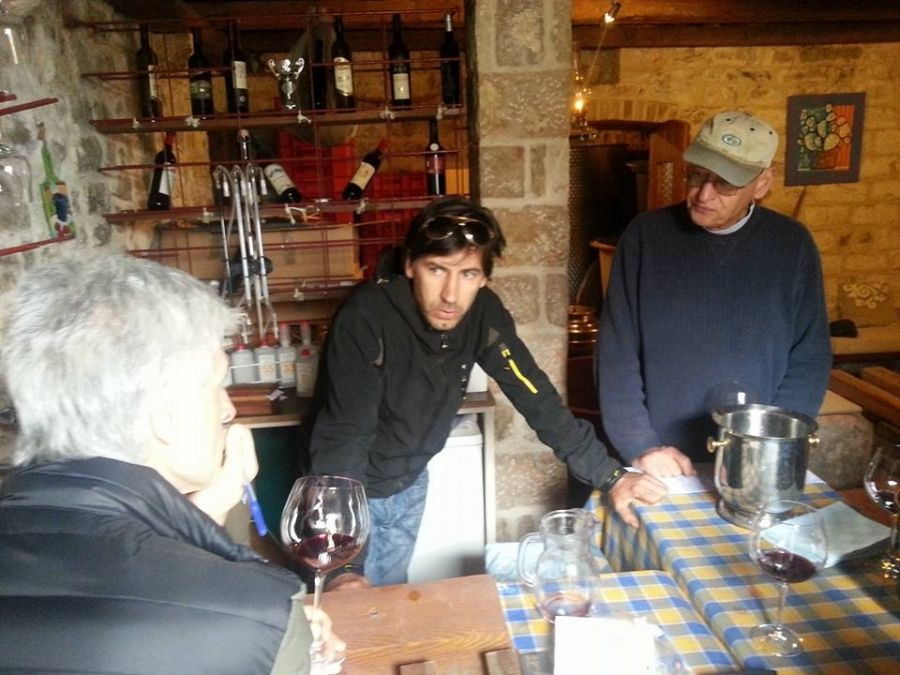
(Teo Huljic conducting a tasting of Hvar's indigenous wines)
And if you are a real wine enthusiast, where else in the world can you island-hop and try grape varieties indigenous to a particular island? After sampling the indigenous viticultural joys of Hvar, check out Vugava on Vis, Dobrota on Solta, Zlahtina on Krk, and the supremely unpronounceable Grk in Lumbarda on Korcula.
Grk is also home to my favourite Croatian wine story. The white wine variety (and my favourite in Croatia) only grows on the sandy soils of Lumbarda, a few kilometers from Korcula Town. As such there are only 33,000 litres a year produced, which puts a strain on supply as it is one of the top restaurant white wines in Croatia. As wine tourism developed, a rule was introduced that each person tasting could buy a maximum of 2 bottles per visit. Otherwise the supply would quickly run out.
The story - which has been verified locally - goes that a member of the Kennedy family ordered the best local white wine in an exclusive Dubrovnik restaurant. So impressed were they that they sailed to Korcula the next day and visited the winery for a tasting.
"Fantastic wine. We will take two pallets."
"Unfortunately, that is not possible, Sir. We only sell a maximum of 2 bottles per person."
"We are the Kennedy family. We will take 2 pallets."
"We are the Grk family. Two bottles only."
I liked that. They apparently returned to the Dubrovnik restaurant and bought the whole supply. At restaurant prices.
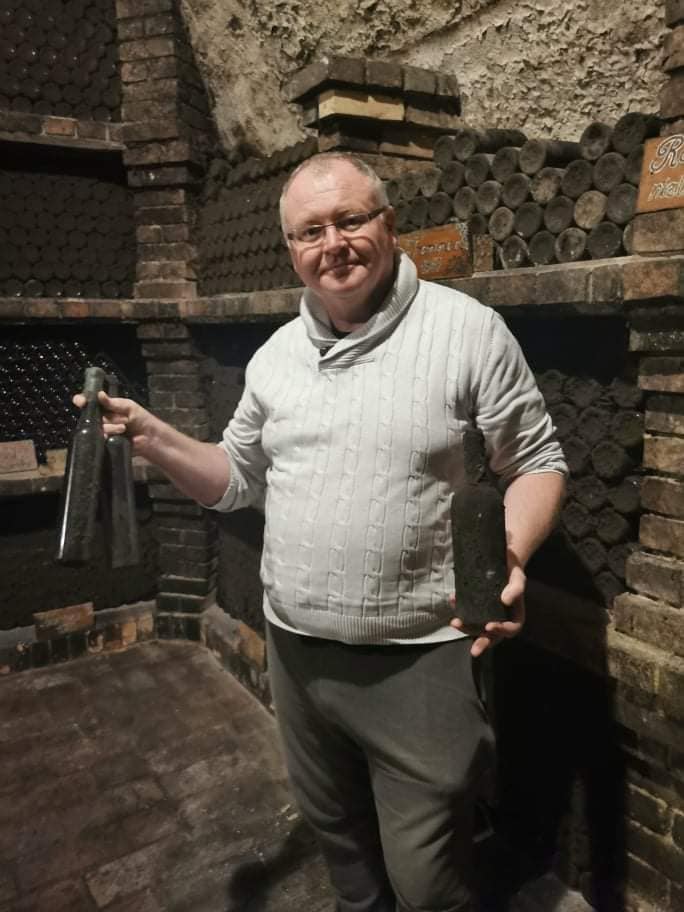
Croatia does have magnificent wine estates with lots of tradition in addition to these small growers. One of the finest wine experiences is Croatia's most eastern vineyard, Ilocki Podrum, in Ilok. Purveyors of wines to the British Royal Family. More than 11,000 bottles of Traminac 1947 were ordered for the Queen's Coronation in 1953. The two other bottles in my hands are the same wine, later vintage, for the weddings of Princes Harry and William. And there are still a few bottles of the Queen's '47 - but it will set you back 55,000 kuna.
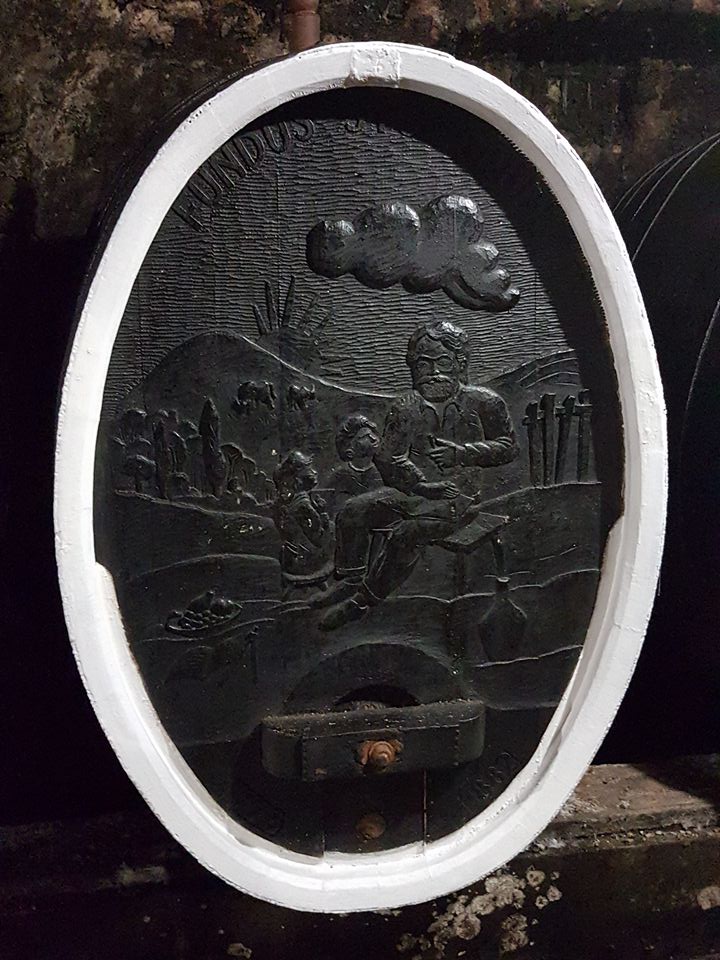
And don't miss Croatia's oldest winery in Kutjevo, where the oak barrels literally tell the story of the town's 800-year history.
As impressive as these estates are - and there are several more - it is the cosy and unpretentious approach of the hundreds of Croatian winemakers who are pushing forward in their own corners of the country, and with increasing success.
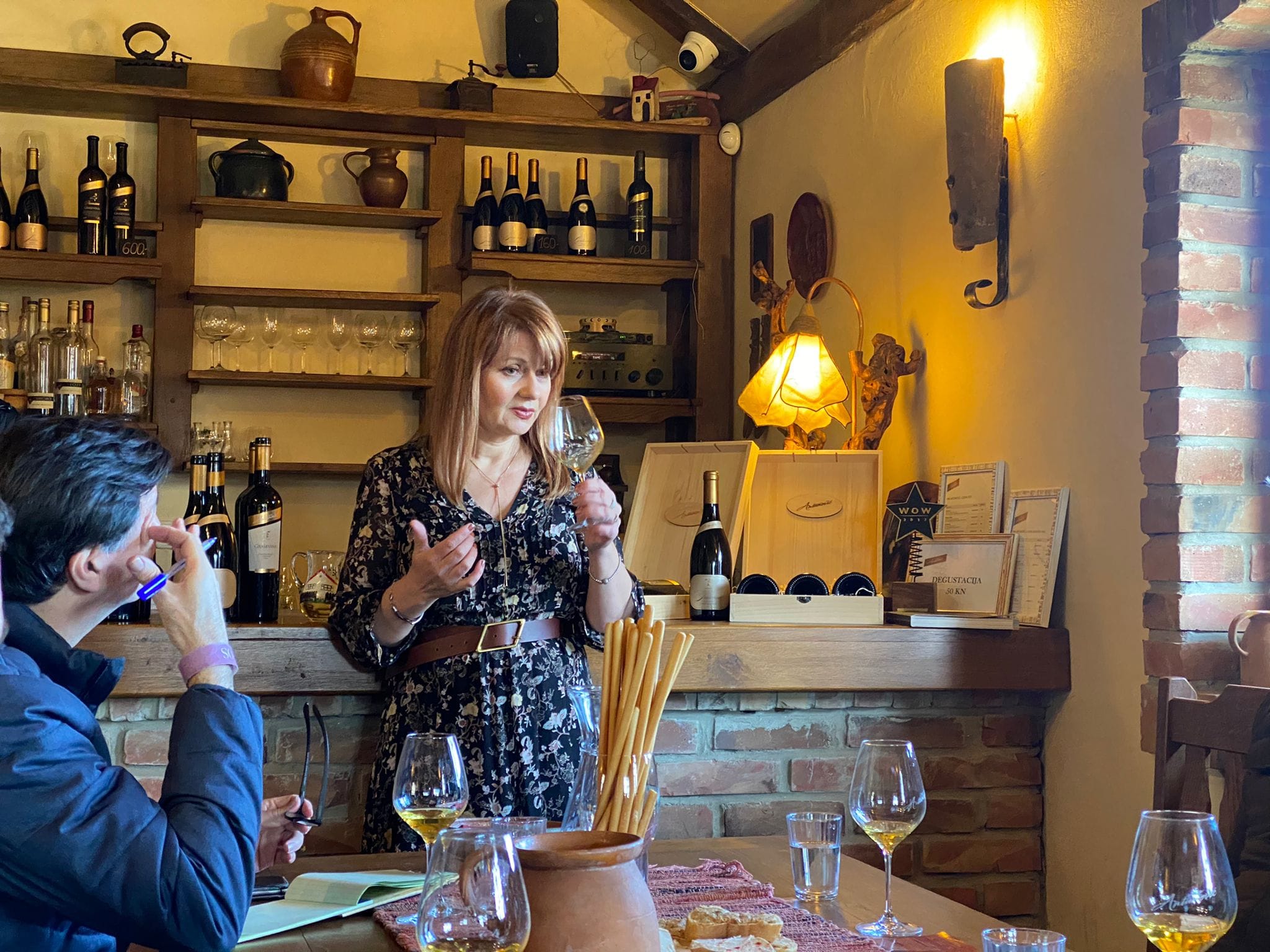
The best white wine I have tried in Croatia? A lesson in just how exciting the Croatian wine scene is. I came across it in a village in eastern Croatia I had never heard of until I arrived - Dalj. And the winemaker - Jasna AntunovicTurk had quite the story. The first female winemaking owner of a vineyard, her passion is Grasevina, but the wine which blew me - and the judges at Decanter - was her 2013 Chardonnay. It would not have been out of place in the premium vineyards of Burgundy.
And it is not just in wine-growing regions of Croatia that you will meet outstanding wines - they are to be found in the most unexpected places. Meet the only winemaker in Split - in an atomic bunker!
The majority of Croatian winemaking is a much less formal affair, and many families in Dalmatia, for example, make their own for family consumption. And wine purists may look in horror at some of the practices they will encounter, but it is more proof that Croatia does things differently.
Red wine and still water is a drink of choice for many in Dalmatia - bevanda. Head to the continent and you will no doubt be introduced to Gemist - white wine and sparkling water. And if you want to go really local, check out the annual Biklijada in Vrgorac, where they celebrate the rather curious bikla - red wine and goat milk. My father-in-law used to drink it as a child, very nourishing apparently. As is another Dalmatian speciality I have yet to try for some reason, Prosek with a raw egg. Great for protein for the little ones.
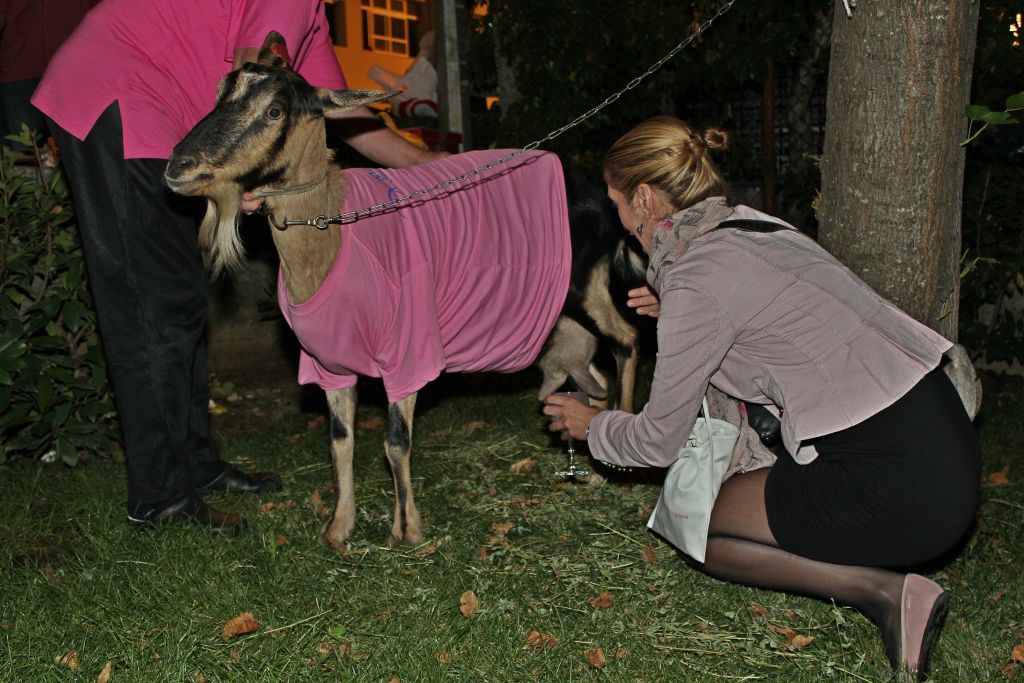
Croatian wine has given me many memorable nights over the last two decades (as well as a few where the memories are a little hazy). Warmth, friendship and authenticity take precedence over protocol and presentation in many cases. Croatian wine is, for me, a symbol of the quality and diversity which makes the Croatian experience so unique, and it has certainly changed my perceptions about wine over the years.
Why not come and have a glass yourself - bring your own plastic bottle for the true rustic experience.
****
What is it like to live in Croatia? An expat for 20 years, you can follow my series, 20 Ways Croatia Changed Me in 20 Years, starting at the beginning - Business and Dalmatia.
Follow Paul Bradbury on LinkedIn.
Croatia, a Survival Kit for Foreigners will be out by Christmas. If you would like to reserve a copy, email This email address is being protected from spambots. You need JavaScript enabled to view it. Subject 20 Years Book
Algebra University College: Interest in Our Studies is 40% Higher than Last Year
July 12, 2022 - Of all private higher education institutions in Croatia, the largest number of high school graduates this year chose Algebra University College as their first choice when applying for study programs. Here's why.
Algebra continues to raise higher education standards, which, according to data published on the Postani student portal, resulted in an increase in applications for study programs by 40 percent compared to last year, or by 27 percent when it comes to the first three choices. According to the current number of applications, Algebra records the most significant growth in interest in design study, for which even twice as many high school graduates applied as last year. In addition, interest in the study of digital marketing increased by 40 percent, while the study of computing recorded 35 percent more applications.
This is the result of continuous investments in the topicality and quality of teaching programs and academic collaborations, such as with one of the oldest components of the University of London - Goldsmiths, which allows students to receive Croatian and British diplomas without leaving Zagreb. As many as 160 prospective students have applied for these studies, evaluated by one of the world's 500 best universities, beginning next academic year at Algebra. For 70 of them, this is their first choice of study. In addition, through cooperation with the University of London, Algebra graduates can choose between undergraduate studies in design, computing, and digital marketing this school year.
"The great interest in Algebra in collaboration with Goldsmiths University is fantastic news. In the year when we celebrate the 30th anniversary of diplomatic relations between Britain and Croatia and our 30-year partnership in all fields - from defense and security to business and culture - the cooperation between Algebra and Goldsmiths in education is further proof that we are strengthening our ties. I wish all participants the best of luck in obtaining a degree from one of the most prestigious British universities," said Simon Thomas, the British ambassador to Croatia.
"British universities are rightly recognized as the most prestigious in the world, and the fact that they make international connections is key to that success," said Nigel Bellingham, director of the British Council, not hiding his enthusiasm for such a great interest in the new partnership between Algebra and Goldsmiths.
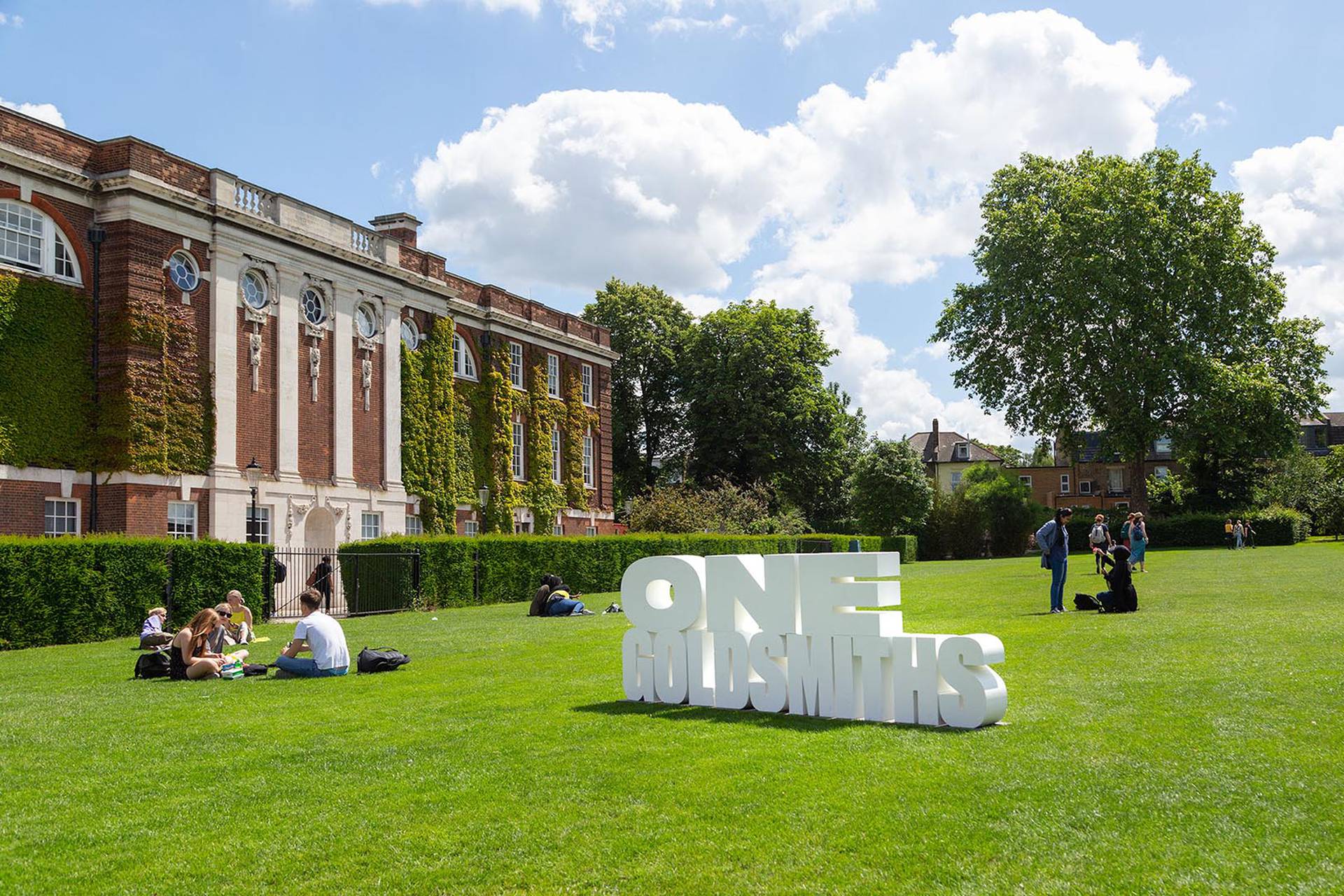
"This cooperation represents a model for other partnerships between Croatian and British universities. The British Council is proud of its partnership with Algebra, and we will continue to work with our friends in Croatia to contribute to the success of this program," concluded Bellingham.
A particular interest is visible among young people who have already completed three-year professional studies since they have the opportunity to enroll in one of the graduate studies in Algebra, and in addition to Croatian, obtain a British or French master's degree after two years of study this year. Graduate studies in data science, computer game development, computer science, and digital marketing can be completed this year with diplomas from the University of London and Algebra, and they also have the joint study "Internet of Things and Artificial Intelligence," which Algebra and French EPITECH accredited last year. This study is also conducted in English, with one year being attended in Zagreb and the second in Paris. EPITECH or L'école de l'expertise informatique et de l'innovation is one of France's largest technological educational institutions, with more than 6,000 students and multiple campuses in several European locations.
Despite the decline in the number of Croatian high school graduates, Algebra records an ever greater interest in its study programs, which is the best indicator that the innovative approach and insistence on the quality of the content and the quality of the teaching implementation make sense.

"We are very focused on the global occupations of the future, and in regular communication with leading Croatian and international employers, we adapt our programs while encouraging the arrival of foreign students. Furthermore, we place great emphasis on practical learning, which we enable students to do through cooperation with renowned domestic and foreign companies, so the knowledge acquired by our students is immediately applicable in everyday work. This is one of the key reasons global and domestic employers highly value our graduates, as evidenced by the fact that within three months of completing their studies, almost all of them are employed in the profession. This is an important motivator for the growth of applications that we are witnessing, even though the number of graduates who want to continue their education this year is ten percent lower than last year," pointed out Mislav Balković, dean of Algebra.
For the last five years, all Algebra graduate studies have been conducted exclusively in English, and from this academic year, this is also possible in almost all undergraduate studies. In addition to opening a new perspective for employment and career advancement, this approach enables an educational experience in a multicultural and multinational environment.
The experience of studying at Algebra took on a new dimension this spring with the opening of the new Zagreb campus, making Zagreb a multidisciplinary center of excellence and an incubator of globally competitive human potential, which will increasingly attract domestic and international students and participants of various educational programs in the coming years. Students have at their disposal 35 modernly equipped lecture halls and laboratories, 14 online cabinets, a video, audio, and podcast studio, a drawing room, a 3D print room, an innovation lab, a large server room, a library, and a room for project collaboration and numerous other specialized rooms.
For more, check out our lifestyle section.
Dubrovnik Pass: Well-Known Dubrovnik Card to See Digital Transformation
July 12, 2022 - "Dubrovnik Pass," a project to digitize the well-known Dubrovnik Card, is a bilingual application that brings visitors benefits and discounts in at city institutions and landmarks.
Presented on Monday in Dubrovnik, the new model offers simple use of the included content and more economical management of funds and time. In addition, it brings to the Dubrovnik city administration more effective marketing and networking of the offers as well as management of visitor flows, reports T.portal.
The city's head of culture and heritage, Julijana Antić Brautović, pointed out that the bilingual digital system unites all electronic cards under one QR code, so users will have access to all benefits with one medium.
"As an innovative solution, the system aligns with the EU Green Plan. It significantly reduces the costs we previously had to create an analog card, and it is possible to create a new offer and prices quickly. Our employees no longer waste time on support but can now focus on product management and new development," said Antić Brautović.
She added that the "Dubrovnik Pass" should also bring savings to promote the destination, as it will be advertised directly to Dubrovnik tourists on social networks.
Siniša Lukač from the company RAO, which technically prepared the project, stated that the system would be used massively and at all times, so its design was demanding.
"The system offers the city's offer, from sights to shops and excursions, to keep tourists in the city as long as possible. The advantage is that it will be possible to monitor the use of the application and thus adapt it to users. In addition, it will be possible to plan visits to locations in times of fewer crowds, that is, to have an overview of which locations are visited more or less," Lukač pointed out.
Marjan Palić from the Atomski marketing agency presented the Dubrovnik Pass digital advertising campaign and emphasized that the strategy is aimed at those users who are already in Dubrovnik, while the final figures of the campaign, which started in June, will be presented in September. "The goal is not to collect 'likes', but to increase the sale of Dubrovnik Pass. The campaign's next phase will involve creating a community," said Palić.
The project was redesigned by Studio Flomaster, following the logic of the old visual identity of the Dubrovnik card, since the basic color code derived from the traditional "Dubrovnik colors" concept was retained. In addition, the logo was shortened by creating the name "Dubrovnik Pass" to "D Pass." The "Dubrovnik Pass" project in the first phase cost HRK 200,000.
For more, check out our lifestyle section.
23 of 49 British Airways London-Zagreb Flights Canceled in August
July 12, 2022 - The latest flight news to Croatia as 23 of 49 British Airways London-Zagreb flights have been canceled in August.
British Airways significantly reduced the number of weekly flights between London (Heathrow Airport) and Zagreb for July, justifying the move by problems in the industry (lack of staff and capacity). The carrier has now reduced the schedule of flights to Zagreb for August, reports Croatian Aviation.
Namely, the OneWorld alliance member canceled 23 of the announced 49 flights between Zagreb and London (Heathrow) planned for August this year.
Due to the lack of workforce within the company, but also due to the problem with the lack of staff at Heathrow Airport, British Airways has reduced the number of weekly flights on several European routes, including the one to Zagreb Airport.
Until a few days ago, British Airways offered up to 12 weekly flights between London and Zagreb. Still, since the number of weekly operations was reduced for July, it was expected that the company would do the same thing in the flight queue for August.
This has now happened, and instead of the planned and announced 49 weekly flights between London and Zagreb, British Airways canceled 23 flights. So now, 26 return flights have been announced for August.
British Airways plans to operate between London and Zagreb 6 times a week in August, every day except Mondays, mainly using its A320 aircraft and A321 aircraft leased from Finnair, which already operates on this route.
The airline has not yet reduced its flight schedule for September, but further cancellations of this carrier are expected.
Croatia Airlines also operates between Heathrow Airport and Zagreb three times a week, every Monday, Wednesday, and Friday, mostly with A319 aircraft. It is also possible to get to London with a direct Ryanair flight from Zagreb to Stansted, an airport approximately 60 kilometers from the center of London.
For more on flights to Croatia and other travel announcements, make sure to check out our dedicated travel section.
Croatian Market Welcomes Spanish Cosmetic Brand Equivalenza
July the 12th, 2022 - The biggest Spanish cosmetic brand Equivalenza has arrived on the Croatian market and will be run by Croatian franchise purchasers right in the very centre of the City of Zagreb.
As Poslovni Dnevnik/Marija Crnjak writes, the largest Spanish cosmetics brand, Equivalenza, has arrived on the Croatian market as a huge chain with more than 700 stores worldwide. Their philosophy is based on sustainability and the availability of premium fragrances and cosmetic products at very fair, affordable prices, with the belief that fragrances can change both mood and ambience.
The first Croatian Equivalenza store was opened last week in the heart of the City of Zagreb, thanks to Igor Drandic and Iva Mihelic Drandic, whose company Bolji miris (a better scent) became the master franchisor of this brand for the Republic of Croatia and the Croatian market through their purchase of the franchise from the Spaniards, with the help of the Colak Franchize Consulting Group.
Reusable bottles
Igor Drandic, a banker by trade, entered this project with his wife Iva who has previous entrepreneurial experience as the owner of a store with clothing by local designers that was closed during the coronavirus crisis, so for Iva, this is represents a very much desired return to private business.
"Given that we already had experience, and as a banker I take numbers very seriously, we had very specific requirements regarding our future project. We decided to buy a franchise because it's already an elaborate and well-established business. We were looking for something that doesn't require a large office space and doesn't have many high fixed costs, nor does it have many employees considering the lack of personnel available on the Croatian labour market. We were encouraged by the fact that Equivalenza has more than 700 facilities across the world already,'' explained Igor Drandic, who didn't reveal the amount of the total investment.
Equivalenza was otherwise founded back in 2011 with the aim of making high-quality fragrances available to everyone at affordable prices, and the prices are lower because there is no branding of the products themselves, nor is there any on the packaging, there are also no middlemen or intermediaries in the sales process because the deliveries go out directly from the factory itself.
As Iva Mihelic Drandic, the company's director, explained, Equivalenza's business model is based on the reuse of glass bottles. Their fragrances are aged for 27 days, and the assortment is based on emotions, and through four lines that represent different states and emotions, along with perfumes, products for body care and creating an ambiance in the home and car have been introduced. The idea is that perfume and face cream, shower gel and body lotion, and oil poured into a diffuser can all have the same scent.
Equivalenza is known as a brand with many loyal customers who return regularly to refill their bottles. In addition to taking care of the environment, they pay attention to social responsibility.
The dilemma between opening a store in a large shopping centre and in the heart of the city centre itself is resolved in favour of the centre of Zagreb, partly due to the uniform traffic throughout the week, while the peak in shopping centres takes place on on weekends, when it is also very crowded. According to the couple who have brought the Spanish franchise to the Croatian market, this would be burdensome for numerous people.
For more, make sure to check out our dedicated business section.
Croatian Residents Spent 8 Billion Kuna on Travel in 2021
July the 12th, 2022 - Croatian residents spent eight billion kuna on travel and trips back during 2021, despite the continuing issues posed by the global coronavirus pandemic during that time.
As Morski writes, back in 2021, 1.35 million Croatian residents or 39.4 percent of them travelled on multi-day trips around the country and also abroad, achieving 25 million overnight stays or 28 percent more than was recorded back in 2020, while spending slightly more than 8 billion kuna, or 51 percent more, and most of the travel and spending was done here in Croatia.
In total, in 2021, Croatian residents aged 15 and over made almost 4 million multi-day trips of three or more nights, which is an encouraging 30.4 percent increase compared to pandemic-dominated 2020.
Most of their trips, more precisely 3.5 million of them, were private in nature, which marked a 27.5 percent increase compared to 2020, and at the same time, they achieved 23 million overnight stays, or 24 percent more. 6.6 billion kuna was spent on these sorts of trips back in 2020, and when it comes to the spending done on these private trips last year, that figure was exceeded by 43 percent.
Compared to the pre-pandemic, record year of 2019, according to the CBS, their spending on private multi-day trips was 28.4 percent lower, which shouldn't come as a surprise considering the unprecedented events which unfolded one year later in 2020.
Most of the private trips taken by Croatian residents, so about 3 million or 28.2 percent more than in 2020, were realised within the borders of Croatia, achieving 18.1 million overnight stays or 23 percent more than back in 2020, and for this, 5 billion kuna or 58.4 percent more was spent.
When it comes to the question of accommodation in Croatia, domestic travellrs on multi-day trips mostly chose non-commercial accommodation, where they spent the majority of overnight stays last year, 15.4 million of them in total, of which 9.1 million were recorded in the properties of relatives and friends, and 6.1 million in their own houses and apartments.
When it comes to the 533,000 private trips Croatian residents made abroad in 2021, of which there were 24 percent more than there were back in 2020, Croatian residents spent around 1.6 billion kuna or 9.4 percent more.
In 2021, business trips by Croatian residents also increased by 68 percent, and on a total of 364,000 such trips, most of which were within the borders of Croatia, a total of 1.4 billion kuna was spent, which is 100 percent more than back in 2020.
According to the months of the year, Croatian residents made the most private multi-day trips in Croatia during the summer months of July and August 2021, 1.3 million of them in total, which is 37 percent of the total amount of private multi-day trips, while they travelled abroad the most in December 2021, realising 95 thousand trips or 18 percent of the total amount of trips abroad, reports N1.
For more, make sure to check out our dedicated travel section.
Demographic Crisis: Hundreds of Croatian Settlements Close to Being Empty
July the 12th, 2022 - The demographic crisis which still has its grip firmly around Croatia's neck is far from something new. These issues have been plaguing the country for years, and now hundreds of Croatian settlements are close to being left totally empty as the population continues to decline.
As Poslovni Dnevnik writes, at least 541 Croatian settlements across the country are on the verge of extinction because they have a maximum of just ten inhabitants, and in another 192 Croatian settlements, there are no living souls left. This devastating data has been highlighted by the first results of the population census by settlements published by the State Bureau of Statistics (CBS), writes Vecernji list.
The worst situation with this terrible trend of dying Croatian settlements and those where there are no more inhabitants left at all is in Karlovac and Primorje-Gorski Kotar County, more precisely in the hilly and mountainous parts of those counties.
Karlovac County is the record holder with 129 settlements that have just from one to ten inhabitants and 30 settlements with no inhabitants, while in Primorje-Gorski Kotar County, mainly in Gorski Kotar, as many as 104 settlements have from one to ten inhabitants, and another 55 of them have no inhabitants at all. Around 11 percent of all Croatian settlements, or 733 of them, have either been left without a living soul to speak of, or on the verge of complete extinction today.
It's worth noting that today, the Republic of Croatia has only 3.88 million inhabitants left, and that in the past decade alone it has lost almost 10 percent of its population.
Although from the census taken back in 2011 to last year (2021), the largest population loss was recorded in the Eastern Croatian county of Vukovar-Srijem, which lost a fifth of its inhabitants and today has around 144 thousand, followed by Sisak-Moslavina County, which lost 18.49 percent, and Brod-Posavina County, which was left without 17.53 percent of its inhabitants, it's interesting to note based on this information that Vukovar-Srijem County only actually has two settlements that have no inhabitants left.
In the very neglected Eastern Croatian (Slavonian) counties, where intensive emigration has occurred over the past decade, it's mostly formerly large settlements which haven't completely been abandoned and been left without a living soul. Pozega-Slavonia County has the most settlements with one to ten inhabitants living there, 42 of them, and another 17 settlements where there are no inhabitants at all. On the other hand, as expected, there are no settlements with up to ten inhabitants in the City of Zagreb, nor are there any in Medjimurje County.
Demographer Stjepan Sterc's data on the increase of almost 200 Croatian settlements in one single decade which are on the verge of complete extinction or of being left totally without inhabitants, is unfortunately far from surprising.
"For hilly and mountainous areas, the area of Karlovac County, Gorski Kotar... this is unfortunately, an expected process. The settlementsin hilly and mountainous areas are disappearing rapidly, which is also shown by the increase in the number of Croatian settlements over the past decade in which just one to ten inhabitants live. The elderly population lives in those places, there are no families with children, and these settlements will disappear by time we conduct the next census'' stated Sterc.
For more, make sure to check out our dedicated lifestyle section.
What Can I Build and Where? Croatian ePlans Editor to Provide Answers
July the 12th, 2022 - Investors seeking to build in Croatia will now have much more quick and clear answers to the questions of what they can build and where they can build it thanks to the Croatian ePlans editor (ePlanovi).
As Poslovni Dnevnik/Suzana Varosanec writes, the spatial plans of the new generation will be created through the new Croatian ePlanovi editor, and the Ministry of Spatial Planning, Construction and State Property is developing this new electronic service.
The ''translation'' of old generation plans into new generation plans will be carried out through the service, so that the new software solution and connection with the Croatian ePlans editor module will facilitate the work of professional developers and bring about the standardisation of all spatial planning documentation.
The reforms being undertaken through the ISPU project - Spatial Planning Information System and its modules represent a ''reform storm'' in this area, because it will remove the toilsome tasks faces by professional developers, and investors will ultimately know about every single location across the Republic of Croatia for which rules are in force, starting with the question of what may or may not be built and where, and all of it will be available online and be free of charge.
The Croatian ePlans editor is otherwise a web-GIS solution that can be used free of charge by expert spatial plan makers, ie those who have the approval of the Ministry to carry out professional spatial planning work.
"Through the Croatian ePlans editor, all spatial plans across the Republic of Croatia will be created and presented in a standardised way. This will enable investors entering the construction process to very easily get answers to questions such as what can or cannot be built and where, what the building should look like, which body issues special conditions and information regarding procedures for each location in Croatia, including building permits and the like, and the data will be available for free on the ISPU Geoportal,'' the Ministry stated.
The Croatian ePlans editor module will enable the much faster and simpler creation of plans, as all official sources will be made totally available to expert drafters, including digital orthophoto maps, layers from the Register of Spatial Units (borders of counties, cities, municipalities and settlements, as well as addresses), always up-to-date digital cadastral plans, other valid spatial plans, as well as all available data from the registers and records of public law bodies.
This entire system was successfully tested in the area of Primorje-Gorski Kotar County, more precisely in Crikvenica, where the spatial plan of the county - the spatial plan of the town and two urban planning plans were ''translated'' from the old to the new generation.
For more, make sure to check out our dedicated business section.
Ministry Issues Ethical Code for Changeover to Euro
ZAGREB, 11 July 2022 - The Ministry of Economy and Sustainable Development on Monday released the code of ethics for the process of switching to the euro at the start of 2023, and all business entities that interact with consumers are called to join the code.
Croatia will enter the euro area on 1 January 2023 after it met all the convergence criteria, the ministry recalls.
The ministry notes that the transition from the national currency to the euro is an important topic that raises many questions, and definitely, a part of consumers are also concerned about possible price rises.
The ethical code has been compiled in a bid to create a safe environment for consumes and to make sure that the changeover from the kuna to the euro will be conducted in a reliable and transparent manner.
In December 2020, the Croatian government and the national bank (HNB) announced the release of an ethical code for the introduction of the euro in the document titled "the National Euro Changeover Plan".
The document reads that "retailers and other service providers will be invited to abide by the ethical code for the introduction of the euro, and will be able to participate in the campaign organised by the Ministry of Economy and Sustainable Development in cooperation with business associations.
For more, check out our politics section.


